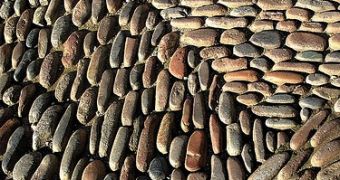Concrete or asphalt containing titanium dioxide can actually clean up the air as cars travel over the surface. 25 to 45 percent of nitrogen oxides from vehicle emissions are removed, according to a research team at the Eindhoven University of Technology in the Netherlands. They also say that this material costs only 10 percent more than for a normal roadway.
In the fight against global warming, most vehicles have strict emissions control equipment. Still enough nitrogen oxides are released to cause acid rains and smog. To solve this problem without any intervention on cars, scientists impregnated paving material with titanium oxide. In addition to sunlight, it causes a chemical reaction that removes the nitrogen oxide from the air and turns it into nitrate.
The teams has been working on this material for a while now, but it was not until last fall that area-wide tests were conducted. Around 1,000 square meters of existing road surface were covered in these air-purifying paving stones, and another 1,000 square meters were paved with normal stone. Measurements at levels between 0.5 and 1.5 meters above the road surface were taken and researchers discovered that the NOx were reduced by almost half, around the vehicles. Scientists also claim that the material can break down algae and dirt, and this keeps the surface relatively clean.
This invention may prove useful for fighting global warming caused by air pollution, nevertheless it rises some questions about its consequences. First of all, there are cost issues. Even if the new paving method costs only 10 percent more than the traditional one, in a few million dollars project it means significantly larger expenses. For this project to be economically viable, it would have to pay itself over time, in cleaning costs or other.
Then, there is the nitrate problem. Nitrates are washed away from the road's surface by rain, according to scientists. The problem is that they are a pollution factor, very mobile in soils. If they get into deep groundwater reservoirs this can affect people's health. If all roads were made out of this material, nitrates could reach lakes and rivers and kill fish or cause other problems, like algal blooms.
Costs aside, a way of controlling these nitrates needs to be found if one day we want to use this material on our roads.

 14 DAY TRIAL //
14 DAY TRIAL //